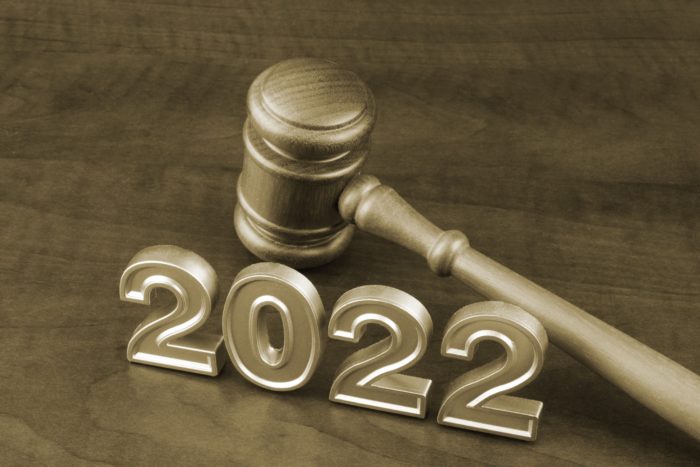
Our probate attorneys are frequently asked: “Can a beneficiary sue on behalf of a decedent’s estate?”
The answer to this question is yes. There are unfortunate circumstances that sometimes require an estate beneficiary to maintain or defend an action on behalf of a deceased person’s estate. Usually, the administrator/executor of the estate is the only party authorized to initiate or defend an action on behalf of a probate estate.[1] This general rule follows the logic that one must be conferred legal standing, or authority to act, before litigation can be pursued on behalf of an estate.
The administrator/executor is the legally appointed personal representative of an estate — a position that consequently confers certain administrator/executor of will duties meant to protect and safeguard the estate and its assets. For this reason, this personal representative has a fiduciary duty to act in good faith on behalf of the estate. This duty extends to defending the estate against harm in lawsuits and/or to initiating lawsuits on behalf of the estate to seek redress for grievances.
Can a Beneficiary Sue on Behalf of an Estate?
In most instances, suing on behalf of a deceased person’s estate is handled by the executor or administrator of that estate. However, nuanced situations sometimes arise where it’s appropriate for a beneficiary to seek redress on behalf of the estate in lieu of the personal representative. Courts and the legislature have identified limited circumstances when a beneficiary of an estate is allowed to sue a third party to seek redress for an injury caused to the estate.[2]
As noted by the Court of Appeal in Bohn v. Smith: “an heir can maintain an action against anyone, except an executor or administrator, for possession of or to quiet title to the real property of a decedent, and if special circumstances justify such, for any other purpose or respecting any other property.”[3] Thus, precedent states that unless a beneficiary is maintaining an action for possession of property or to quiet title regarding real property, that such “special circumstances” must exist for that beneficiary to proceed with his or her lawsuit on behalf of the estate.
Under What “Special Circumstances” Can a Beneficiary Sue on Behalf of an Estate?
Beneficiaries may wonder: What qualifies as “special circumstances” in California to permit them legal standing to litigate on behalf of an estate?
Subsequent to the Bohn vs. Smith case, the Appellate Courts have occasionally recognized “special circumstances” where it has been deemed appropriate to allow the beneficiary of an estate to pursue an action because the personal representative cannot or will not act.[4] Accordingly, these recognized examples provide limited exceptions to the general rule that a beneficiary cannot maintain an action on behalf of an estate.
When a Conflict of Interest of the Personal Representative Confers Standing to a Beneficiary to Sue on Behalf of a Deceased Person’s Estate
One example of a defined special circumstance in California is discussed in Olson v. Toy (1996) 46, Cal.App.4th 818 (“Olson”), wherein a defendant was both a personal representative of a probate estate as well as the trustee of a trust that the estate beneficiaries contended should be declared invalid because of the defendant’s own misconduct.[5]
In Olson, the beneficiaries of the decedent’s estate alleged that the decedent executed an inter vivos trust prior to her death, and that the trust was invalid due to undue influence exerted by the defendant upon the decedent in connection with the trust.[6]
Trial Court Rules Plaintiff Estate Beneficiary Heir Does Not Have Standing to Seek Redress from Decedent’s Trust
In her declaratory relief cause of action, the plaintiff estate beneficiary sought a declaration that the trust was invalid, and thus, unenforceable. She also sought to impose a constructive trust on the trust’s assets, which would compel the defendant to hold the assets for the benefit of the estate, and for ultimate distribution pursuant to the terms of the decedent’s will (not the decedent’s trust).[7]
At the trial court level, the defendant argued that because the plaintiffs were not trust beneficiaries, they lacked standing to sue for any declaratory relief on behalf of the estate. The trial court agreed with the defendant and concluded that the plaintiffs, as beneficiaries of the decedent’s estate, did not have standing to maintain an action for declaratory relief in this trust action, or to impose a constructive trust over trust assets for the benefit of the estate.[8]
Appeals Court Reverses Decision, Citing Existence of Special Circumstances That Allow Beneficiaries to Sue on Behalf of the Estate
The Court of Appeal did not agree with the trial court’s decision. It held that the trial court erred in ruling that the plaintiff estate beneficiaries did not have standing to maintain such an action.[9] In so holding, the Olson court relied on Probate Code section 9654, which provides “the heirs or devisees may themselves, or jointly with the personal representative, maintain an action for possession of property or to quiet title to property against any person except the personal representative.”[10]
Thus, the court determined that the plaintiffs’ action for a constructive trust was, in effect, an action seeking possession of estate property, and that alone conferred the estate beneficiaries with standing to pursue the action against the defendant trustee pursuant to Probate Code section 9654.[11]
Moreover, the Court of Appeal held that the plaintiff estate beneficiaries had standing to pursue an action apart from the authority set out in Probate Code section 9654. The Olson court found that there were indeed special circumstances that implicated the exception that allows a decedent’s estate beneficiaries to bring an action in their individual capacities. As the defendant here was both the trustee of the trust as well as the decedent’s personal representative, the defendant argued that the action could not be maintained against her as the personal representative of the estate, as such an action is prohibited by Probate Code section 9654.
However, the Court of Appeal disagreed, citing the fact that the defendant was being sued in her capacity as trustee and not as the decedent’s personal representative.[12] Under the circumstances (i.e., when the trustee herself was accused of undue influence in the creation of the trust), it could hardly be expected that the personal representative would seek to hold herself accountable in her capacity as trustee, or “to initiate an action to declare invalid the trust which she administers as trustee.”[13]
Thus, under the holding in Olson, an estate beneficiary may maintain an action on behalf of an estate when the estate’s personal representative has a conflict of interest in bringing such an action themselves.

When an Elder Financial Abuse Claim Needs to Be Brought by an Elder Who Is Both the Personal Representative and an Estate Beneficiary
Can a beneficiary sue on behalf of an estate when elder financial abuse is involved? Is elder financial abuse considered a “special circumstance” in California?
The Court of Appeal identified another example of what was determined to be requisite “special circumstances” that give a beneficiary the right to seek redress on behalf of the estate in Ring v. Harmon (2021) 72 Cal.App.5th 844 (“Ring”). In Ring, the plaintiff was the elderly mother of a decedent who was left a house pursuant to her daughter’s will.[14]
Through the series of unfortunate events, while in her capacity as the personal representative of her daughter’s estate, the plaintiff was the victim of an abusive scheme by the defendants to lure her into a predatory loan using estate real property as collateral.[15] The plaintiff sued the defendant mortgage broker and lender for elder financial abuse.[16]
Trial Court Holds That a Personal Representative Cannot Bring a Claim for Financial Elder Abuse on Behalf of an Estate Beneficiary
At the trial court level, the court held that plaintiff did not have standing to bring her causes of action in her individual capacity as an estate beneficiary, but rather could only pursue the claims in her role as personal representative of the estate.[17] On appeal, the Court of Appeal agreed that there was no reason why the plaintiff could not, in her capacity as personal representative of her daughter’s estate, pursue the majority of the claims she asserted against the defendants, given that the estate was the actual borrower of the predatory loan.[18]
However, the Ring court conceded that no prior authority supported the notion that a personal representative has standing to bring an elder abuse claim on behalf of an individual beneficiary of the estate.[19] Rather, the Ring court acknowledged that the statutory scheme underlying claims for elder financial abuse only permits the elder (in their individual capacity or through a defined agent) to bring a claim for elder abuse on their own behalf.[20]
Therefore, the plaintiff, in this instance, could not have pursued her individual elder financial abuse claim solely in her capacity as personal representative of the decedent’s estate.
Through the Ring court’s analysis, it became clear that there was no other remedy for elder financial abuse available to the plaintiff in her individual capacity, given the uniqueness of her situation as both an elder personal representative and beneficiary. In other words, she could not litigate in her capacity as personal representative because the elder financial abuse statute did not allow it, and she could not litigate in her individual capacity against the personal representative because the plaintiff here also served as the personal representative.[21]
Thus, because the beneficiary and the personal representative of the estate were the same person, it was unclear how she could obtain any relief whatsoever for this elder financial abuse.
Court Determines Plaintiff’s Lack of Recourse to Recover Elder Financial Abuse Damages Constitutes a Special Circumstance in California
The crux of the Ring case is that the plaintiff, who also happened to be a beneficiary of the estate, was taken advantage of both as an individual estate beneficiary and in her capacity as the personal representative of the estate. Accordingly, the predatory loan damaged not only the estate, but her individual beneficial interests as well.
Given the statutory standing requirements for an elder abuse claim, the plaintiff could not bring suit against the defendants in her capacity as personal representative nor was there a third-party administrator who could have been held responsible for the damages.
Thus, the Ring court determined that due to the lack of recourse for the plaintiff’s elder financial abuse claim, these facts created a “special circumstance,” such that an estate beneficiary could bring a claim on behalf of the estate. Ultimately, the court held that when an elder is both a beneficiary and personal representative of an estate, that individual has standing to bring a claim for elder financial abuse in their individual capacity based on harm to the estate.[22]
Key Takeaway: Only When No Other Remedies Are Available Is a Beneficiary Suing on Behalf of a Deceased Person’s Estate Possible
It should behoove beneficiaries to be aware that the courts are likely reluctant to find that “special circumstances” exist to confer them standing to sue on behalf on an estate in most instances, short of compelling situations that would justify an exception to the rule.
However, as Olsen and Ring demonstrate, courts are mindful that situations do sometimes arise where estate beneficiaries are the only parties willing and able to act to protect the estate’s interests, and to prohibit them from litigating on behalf of the estate would effectively foreclose any remedy for that beneficiary.
Thus, in situations where a beneficiary feels that an estate has suffered some type of harm and the personal representative is failing to act, it is important for the beneficiary to speak with an experienced probate firm to learn what remedies may be available to them in their individual capacity.
Have questions about suing on behalf of a deceased person’s estate? Get in touch with us.
If you are a personal representative or beneficiary with questions about suing on behalf of a deceased person’s estate, you have come to the right place.
Keystone’s probate attorneys work with both fiduciary and beneficiary clients seeking to bring a claim against or on behalf of an estate or trust on a daily basis and are well-versed in the types of remedies that are available for both groups.
Our team can also help you determine if your situation falls under the special circumstances in California that allow beneficiaries to seek redress on behalf of an estate in lieu of the estate’s personal representative. Call us today to schedule your free consultation.
- [1] Prob. C. §9820
- [2] Prob. C. §9654
- [3] Bohn v. Smith (1967) 252 Cal.App.2d 678, 680-681.
- [4] Id.
- [5] Olson at 821-824.
- [6] Id.
- [7] Id.
- [8] Olson at 822.
- [9] Olson at 823.
- [10] Prob. C. §9654.
- [11] Olson at 823.
- [12] Olson at 824.
- [13] Id.
- [14] Ring at 848.
- [15] Id.
- [16] Id. at 849-849.
- [17] Id.
- [18] Ring at 851.
- [19] Id.
- [20] See Cal. Welf. & Inst. C. §15610.30
- [21] See Prob. C. §9601(a).
- [22] Ring at 852.













